Article contents
Discussion: On the Common Lament, that a Person Cannot Make Much Difference in This World
Published online by Cambridge University Press: 05 January 2012
Abstract

- Type
- Discussion
- Information
- Copyright
- Copyright © The Royal Institute of Philosophy 2012
References
1 Nagel, Thomas, ‘The Absurd’, in Mortal Questions (Cambridge: Cambridge University Press, 1979)Google Scholar.
2 There are two splendid seminal discussions of the ‘A person cannot make a difference’ issue: ch.3 of Parfit's, DerekReasons and Persons (Oxford: Oxford University Press, 1984)Google Scholar; and Glover's, Jonathan ‘It Makes No Difference Whether or Not I Do It’, in Singer, Peter, ed., Applied Ethics (Oxford: Oxford University Press, 1986)Google Scholar.
3 There is an interesting and difficult question at this point, of whether it is easier to make a positive or negative difference that matters, but we shall not take this up here.
4 Derek Parfit has claimed that ‘It is not enough to ask, “Will my act harm other people?” Even if the answer is No, my act may still be wrong, because of its effects on other people. I should ask, “Will my act be one of a set of acts that will together harm other people?” (op. cit. note 2, 86). I have serious doubts whether this sort of consideration can sway most people, when they are required to sacrifice something that matters to them. When preparing this paper for publication, Kagan's, Shelly ‘Do I Make a Difference?’ Philosophy and Public Affairs 39:(2011), 105–141CrossRefGoogle Scholar appeared. Kagan concludes by emphasizing the risk that one might after all make a difference. In some cases this may be a salient consideration, but in most of the relevant cases it is not. As far as I can see, his points do not much affect my claims, particularly in threshold cases where one can know, beyond any reasonable doubt, that it does not matter what one, as an individual, will do.
5 Because totalitarian regimes are ‘control freaks’ and care so much about individual conformity, even small divergences made in protest can, under certain conditions, make a difference in practice, whereas a similar action would have no effect in a liberal democracy. Such actions may also have positive moral or spiritual meaning because of the need to resist the oppressor, at least internally, but this form of ‘mattering’ exceeds the scope of this paper.
6 As I have argued elsewhere, morality is obliged to attempt to eliminate the conditions under which moral heroism is required, even if this will abolish as a result the heights of moral worth. See Smilansky, Saul, ‘Morality and moral worth’, in 10 Moral Paradoxes (Malden, MA: Blackwell Publishing, 2007)CrossRefGoogle Scholar.
7 Since by now we already know when and where bad things are about to happen in history, would it not be morally wonderful if they could be modified in a benevolent fashion? If we could travel back in time, we would arguably be obliged to do so and change bad things that were about to happen. In principle, we would be morally obliged to change things even at the cost of preventing our later coming into existence, meaning that we ought to be ready to prevent historical calamities even when those calamities are a necessary condition for the existence of ourselves or our loved ones. Given the logical limitations to the possibility of changing the past in major ways, if not necessarily to time travel itself, this option can be set aside. I have discussed this issue in ‘Morally, should we prefer never to have existed?’, (unpublished manuscript).
8 When our integrity is on the line, however, moral considerations about the difference one can make may become surprisingly demanding, even under more or less commonsensical views. See Smilansky, Saul, ‘The paradox of beneficial retirement’, in 10 Moral Paradoxes (Malden, MA: Blackwell Publishing, 2007)CrossRefGoogle Scholar.
9 The ‘ethics of potential’ brings up interesting questions, but can be left for another occasion. It seems to me that while I might incur certain obligations in lieu of being in a certain powerful position, and may not ‘degrade’ my powers just in order to avoid those obligations, I am not typically under obligation to maneuver myself into that position, let alone transform myself into a person who might reach such a position.
10 I am very grateful to Zohar Geva, Amihud Gilead, Guy Kahane, Iddo Landau, Tal Manor, Ariel Meirav, Avital Pilpel, Talia Shaham and Daniel Statman, for comments on drafts of this paper.
- 5
- Cited by


